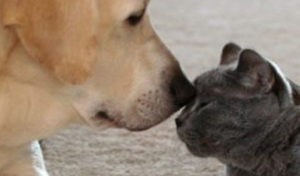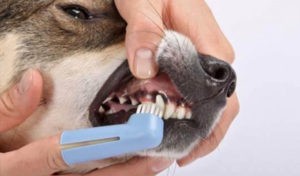85% of pets have periodontal disease by 3 years of age.
85% is a stark percentage considering how severe periodontal disease is and how easy it is to prevent. Periodontal disease is a condition characterized by attachment loss of the tooth, this means that the oral cavity has become so diseased and overpopulated by bacteria that the tooth and alveolar bone (the bone that holds the teeth in place) have become structurally compromised. In severe periodontal disease, the alveolar bone begins to degrade, risking potential jaw fracture as it weakens.
Periodontal disease is not just an oral problem, in addition to causing severe pain and infection in many animals, it is a systemic disease. Periodontal disease originates in the animals mouth, but can compromise many body systems including the heart, liver, and kidneys.
Periodontal disease is unfortunately only treated by Dental Prophylaxis (which we perform almost daily here at McQueen Animal Hospital), but does it have to progress to that point? Routine dentistry is necessary to ensure your pet has a healthy mouth. Whether you have a dog or a cat, even a horse, just like you and I our pets need to undergo routine dentistry. However, there are many ways you can boost your pet’s oral hygiene at home.
Don’t forget to brush!
The #1 at-home dental care tip that every veterinarian recommends is brushing of the outer surface of your pets teeth. Brushing is the most effective way to maintain your pet’s oral hygiene at home. In animals with a healthy oral cavity, brushing every other day to three times a week is adequate, in animals with preexisting gingivitis, daily brushing is needed.
To properly brush your pet’s teeth you need the right tools; for cats and puppies, soft finger tooth brushes and small bristle brushes can be purchased, bigger brushes can be purchased for dogs. When it comes to tooth paste, special canine/feline tooth paste must be used; this is because our pets often ingest the toothpaste used so we offer safe, meat-flavored formulas. All of these materials can be purchased at McQueen Animal Hospital.
If you would like begin brushing your pet’s teeth, it is ideal to start out when they are young. Get them used to their mouths being touched and examined as puppies and kittens, and reward them with treats afterwards and during the experience. It is best to do this daily when they are young, you can even start off by rubbing their teeth with your finger to mimic the action of brushing. As they get older and more comfortable you may introduce a small tooth brush without toothpaste to their teeth, gently running it along their teeth. Once they get more comfortable with this, introduce toothpaste either on your finger or on the toothbrush.
Do not start out brushing your pet’s teeth with the intention of being as thorough as when you are brushing your own. Remember, when you are just starting out the most important aspect is to make the experience as least traumatic as possible and an overall enjoyable experience. If your pet has a bad experience with teeth brushing early on, this could make it very difficult to work on their oral cavity in the future.
If brushing your pet’s teeth is too difficult for you to achieve, a less effective alternative is to purchase the DentaChlor oral rinse from our clinic and simply rub this on your pet’s teeth with a dampened gauze.
Many other oral hygiene products are available on the market (such as dental pads, gels, and wipes) but always make sure that these products have research to back up their effectiveness and are approved by the Veterinary Oral Health Council.
Use Dental Toys
An additional and effective way to clean your pet’s teeth is to use abrasive and bumpy chew toys to remove built-up tartar. Sometimes, canine/feline tooth paste can be inserted into kong-style dental toys to further clean their teeth. These kinds of toys can be purchased online and in pet stores.

Dental Diets
Prescription and store-bought dental kibble and treats can be purchased if desired; such as Hills t/d and Royal Canin dental which may be purchased in-clinic. These foods are specially formulated to have an ideal shape, size and texture in order to scrub the tooth’s surface and remove stuck on debris. Water additives are another option; these solutions are safe for consumption and can be purchased at our clinic. Dental water additives help to create and maintain an ideal bacterial biome in your pet’s mouth and freshen their breath.


There is a large misconception that things such a dental diets and chew toys can replace teeth brushing and dental prophylaxis, consider how your teeth may look if you were to stop brushing and instead only consumed crunchy foods at bed time and rinsed your mouth out with mouth wash. Dental prophylaxis and brushing is required to create and maintain a healthy oral cavity in your pet.
If you have any questions regarding proper oral hygiene in your pets and where to purchase any of the items listed above, please feel free to contact our team at McQueen Animal Hospital so we may help you form a dental health care regime specifically tailored to your beloved pet.
McQueen Animal Hospital is proud to provide you with finest quality services in animal care in the Brampton region; we are located at 8975 McLaughlin Road, L6Y 0Z6 and are happy to answer any of your questions via phone at 905-455-7387.
Author: Jessica Wilkans, RVT at McQueen Animal Hospital



